Published Nov 15, 2024 | 9:00 AM ⚊ Updated Nov 18, 2024 | 8:25 AM
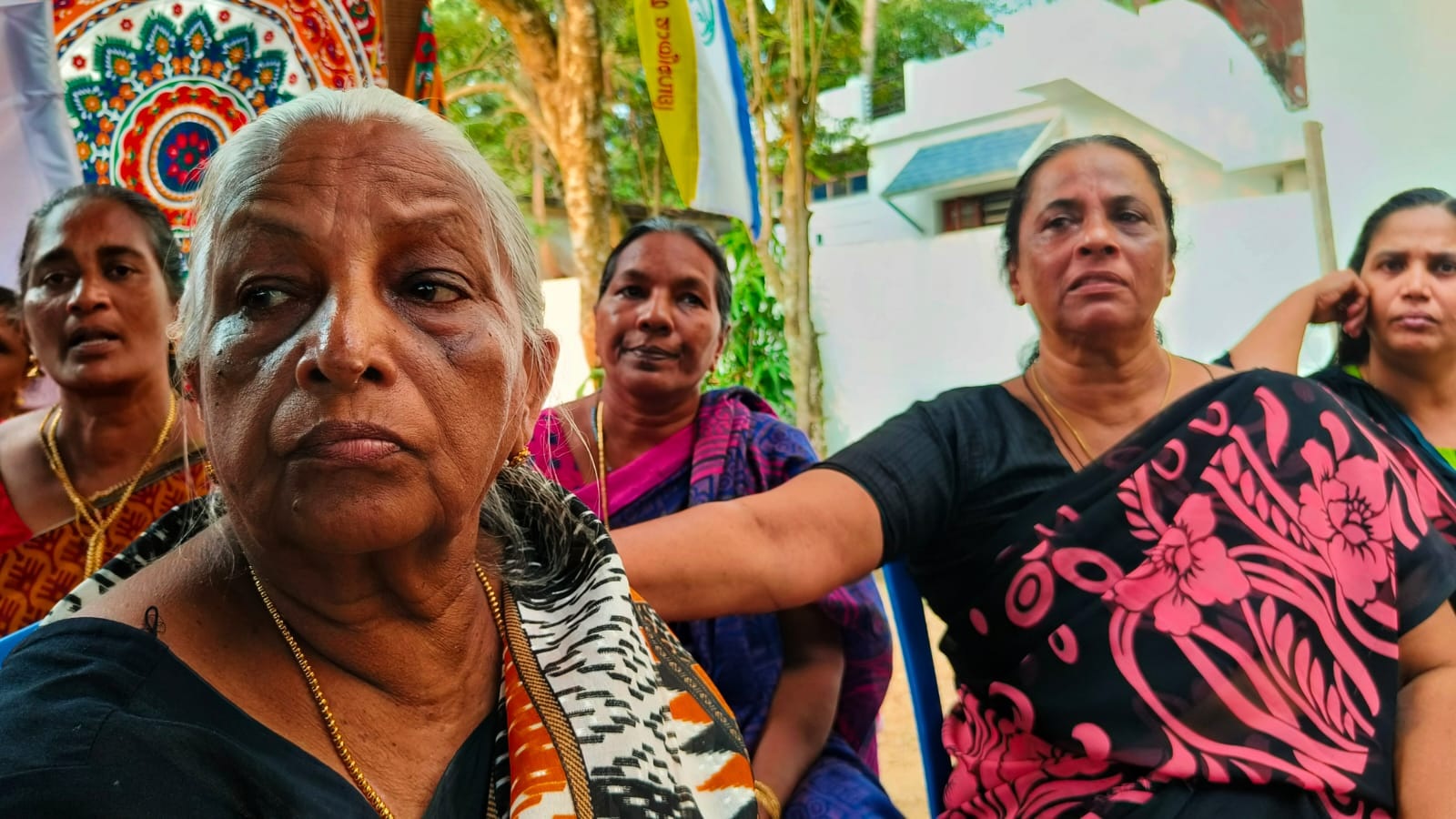
Women leading a protest over the Waqf land dispute in front of the Velankanni Church at Kadappuram in Munambam.
Five kilometres away from the vibrance of Kochi city, the sights change as the coastal village charm gently takes over.
Fishing harbours dot the landscape, boats bob on the waves, and fishermen go about their daily rhythm. The houses, painted in shades of white, green, and aqua blue, mirror the hues of the sea, blending seamlessly with the coastal scenery.
The bus towards Kozhuppilly Beach Road is not crowded. Most passengers seemed to know each other. Their conversations stir a sense of unease, focused on the growing tension surrounding the Waqf land dispute.
Beena Varghese, from Kozhuppilly next to Munambam, shared her concerns, despite her only vague understanding of the matter. “The Waqf Board is offering money to mainstream channels, which is why no media is covering the issue in Munambam,” she said.
“I’m a Latin Catholic, and every Sunday our priests ask us to pray for Munambam, distributing notices about the Waqf issue in our churches,” she said.
The bus eats up the distance and reaches Munambam, 28 kilometre from Kochi. A private vehicle or autorickshaw goes to Munambam Kadappuram, a small coastal village, from the bus stop. Narendra Modi and Amit Shah beam at the visitors from the many posters dotting the predominantly Christian area.
Religious institutions like temples and churches serving as sites for protests are a rare occurrence in Kerala.
In a remarkable display of interfaith solidarity, members of the Christian and Hindu communities have come together at the grounds of Velankanni Church in Kadappuram, Munambam, to stage a hunger strike in protest against a land dispute with the Waqf Board.
The protest entered its 33rd day on Thursday, 14 November. People in groups, mostly led by various dioceses, kept arriving at the church in solidarity with the protesters. The fishermen’s community at Munambam has lost hope in the state government’s intervention.
Chief Minister Pinarayi Vijayan has called for a meeting on 22 November, but locals remain skeptical.
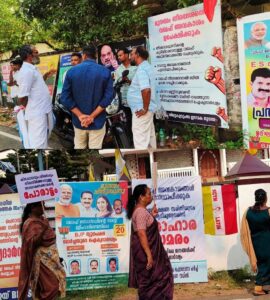
Posters of Modi and Amit Shah in front of the Velankanni Church at Kadappuram in Munambam.
“No one cared about our concerns until MP Suresh Gopi visited us on the 17th day of our hunger strike,” George Cletus, a resident of Kadappuram, told South First.
“Only then did the media start covering the Waqf land dispute in their local columns. This land belongs to us, not the Waqf Board. We’ve learned that in other parts of Kerala, like Wayanad, people have received notices claiming their land as Waqf property. If the Waqf can claim anything, how are we supposed to live here,” he said.
Cletus added that some Muslim residents from nearby areas have expressed solidarity with their cause. However, he felt that only a visit by Prime Minister Narendra Modi or Home Minister Amit Shah would address the issue.
“We’ll stand with those who stand with us, that’s for sure,” he said, noting that BJP leaders, including Sobha Surendran, have expressed support. Union minister Shobha Karandlaje visited the protesters on Thursday.
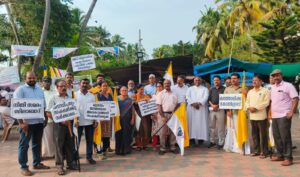
A solidarity group led by Fr. Dr. Job Padayattil arrived from Thrissur.
Although leaders from the RSP, Kerala Congress, Congress, and CPI(M) have extended support, many in Munambam feel the BJP is the only party committed to finding a solution.
As a parliamentary panel continues its discussions on the Waqf (Amendment) Bill, 2024, the Munambam land dispute has garnered significant attention.
The Kerala State Waqf Board has long asserted its claim over 404 acres along the Munambam coast, an area that has been home to around 610 Hindu and Christian families for generations.
Tensions escalated when the Muslim body obtained the title deeds for the land, leading to protests from the residents. This issue has been further politicised by the BJP.
This development follows the Kerala Assembly’s recent unanimous resolution urging the Centre to withdraw the Waqf Amendment Bill, adding another layer of complexity to the ongoing debate.
Joseph Benny, the leader of the Munambam hunger strike, spoke to South First about the ongoing land dispute in the region.
Shedding light on its historical context, he explained that over 610 families in Munambam, most of whom rely on fishing for their livelihoods, will be impacted by the Waqf claims on the land.
Of these families, more than 450 belong to the backward Latin Catholic community, while the rest are from Hindu communities like Ezhava, Kudumbi, and Dheevara.
The dispute dates back to 1902, when the Travancore royal family leased 404 acres, already inhabited by fishing communities, to a trader named Abdul Sathar Moosa Sait from Gujarat, who had settled in Mattancherry near Fort Kochi.
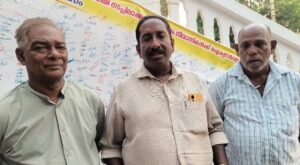
Martin, Joseph Benny, and Nelson
In 1948, Sait’s son-in-law, Mohammed Siddeeq Sait, registered the leased land in his name.
Later, he transferred the land to the management of Farook College in Kozhikode, an institution founded in 1948 to educate Muslims in northern Kerala.
A Waqf deed was registered on 1 November 1950, at the Edappally sub-registrar’s office, officially transferring the land to the president of Farook College.
The title deed for the land was handed over to the management of Farook College nearly ten years later.
While Joseph Benny recounted the history of the land dispute, Martin and Nelson, natives of Munambam, added a deeper emotional layer to the story. Martin, who lost his father in the Punnapra-Vayalar police firing, said, “We shed our blood for this land, but now we are struggling to survive. We are uneducated, and so, anyone can deceive us with official papers.”
“Now, the land has value,” Nelson added. Celebrities like actor Jayasurya own properties here. Resorts are sprouting, and the beach is being developed. No one claimed this land when it was underdeveloped, but now, thanks to our hard work, it has become valuable. That’s why the Waqf Board is now eyeing our land.”
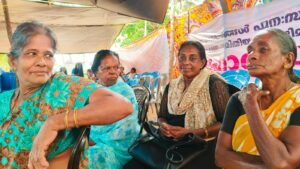
Philomina Cletus, Mercy Joseph, Shalott, and Elsy Thomas.
Shalott, originally from Munambam, lives in a rented house despite owning land in the area.
Unfortunately, she is unable to use the land as collateral to secure a home loan. With a deep sense of sorrow, she recalls the legal struggle that took place years ago and the pain she felt watching her parents being imprisoned during the protests of the 1960s.
In a conversation with South First, Shalott shared that in the late 1960s, a legal conflict arose between the long-time residents of the land, who had no official documentation to prove ownership, and the management of Farook College, which sought to evict them.
The issue was eventually settled outside of court, with the college agreeing to sell the land to the residents. However, Shalott reveals that her parents paid double the market value for the land, and from that point onward, they began paying land taxes.
Despite this, the sale deeds inaccurately claimed the land was obtained through a gift deed in 1950, failing to acknowledge that it was waqf property granted to the college president for educational purposes.
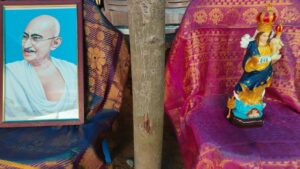
Photo of Mahatma Gandhi and Our Lady of Velankanni in front of the Munambam protest site.
According to insights shared by Mercy Joseph, Philomina Cletus, and Elsy Thomas from their extensive newspaper knowledge, the issue of the Munambam land dates back to 2008 when the LDF government under VS Achuthanandan appointed an inquiry commission led by retired district judge MA Nissar, following several complaints against the state’s Waqf Board.
The commission submitted its report in 2009, which concluded that the Munambam land was indeed Waqf property.
It also revealed that the college management had sanctioned its sale without the Waqf Board’s consent, recommending steps to recover the property.
Building on this, in 2019, the Waqf Board declared the land as Waqf property and instructed the Revenue Department to cease accepting land tax payments from the current occupants, who had been paying taxes for years.
However, in 2022, the state government overruled the Waqf Board’s directive. In response, the Board challenged the government’s decision in the Kerala High Court.
As of now, the court has stayed the state government’s order, and the issue remains unresolved with multiple appeals from both the land’s occupants and the Waqf Protection Samithi still pending in court.
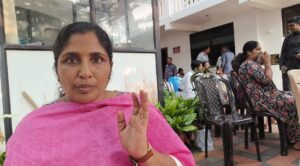
Sandhya Philip, a leader in the Munambam protest.
Sandhya Philip, a native of Munambam, told South First that the community has more stories to tell than just a legal battle.
Due to the ongoing financial crisis, many students are unable to pursue higher education, as parents can no longer pledge their land for loans. Some students have even attempted suicide, overwhelmed by uncertainty about their academic futures.
Furthermore, youth in the area have difficulty getting married, as outsiders warn that marrying someone from Munambam means facing an uncertain future, with no guarantees of stability.
“We want our revenue rights back,” she emphasized.

Fr. Antony Thomas, the assistant priest of Velankanni Church, Munambam.
Fr. Antony Thomas, the assistant priest of Velankanni Church, emphasized human rights violations while discussing the issue with South First.
“How can the government ignore such a clear violation of human rights? People have paid land taxes for years, and now the Waqf Board claims this land belongs to them.”
“We, the Catholic Diocese, stand with the people of Munambam. Many other religious leaders are also offering their support,” Fr. Thomas expressed hope for a positive outcome in the meeting with the chief minister on 22 November.
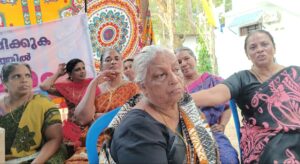
Biji Joy, Smitha Benny, Simi Brijith, Mary James, Rosy, Annaa, and Molly Samson- Natives of Munambam
Biji Joy, Smitha Benny, Simi Brijith, Mary James, Rosy, Anna, and Molly Samson were highly critical of the Waqf Board.
They highlighted their sacrifices to lead the protest, pointing out that many participants had to leave their jobs, resulting in financial hardship.
Despite this, they emphasized that the protest was a priority above all else, as survival without land was simply not possible. They also credited actor-MP Suresh Gopi’s visit with bringing much-needed national attention to their cause.
ES Purushothaman, a member of the BJP state committee, is at the forefront of the Munambam protest. He accused the state government of double standards regarding the Waqf issue.
He justified the Modi government’s stance on Waqf land disputes, stating, “When the BJP intervenes, everyone fears.”
He criticised the CPI(M), Congress, and IUML for supporting the Waqf Board, and pointed out their selective protests, questioning, “They protest over Palestine, but what about Munambam?”
His comments reflect strong support for the Modi government’s position on Waqf Board land disputes while highlighting the inconsistency of the Opposition parties.
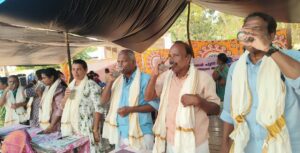
Protesters continue their hunger strike on the 33rd day, ending it each day with lime juice at 5 pm, awaiting a final decision on the Waqf land dispute.
Union Minister Shobha Karandlaje said on Thursday that a powerful land mafia is targeting lands owned by farmers and underprivileged communities through Waqf claims.
After visiting Munambam in Ernakulam district, where approximately 610 families are protesting against these claims, Karandlaje alleged that a land jihad campaign was underway, aimed at seizing lands from legitimate owners.
Karandlaje questioned the rapid expansion of Waqf Board land ownership. She said in 1954, when the Waqf Act was introduced, the Board managed around 10,000 acres nationwide. Today, it is the third-largest landholder after the Defence Ministry and Indian Railways, with control over 3.8 million acres. How did this dramatic increase occur?
Karandlaje urged that land previously owned by Munambam residents until 2019 should be returned to them, citing the legality of their claims.
She asserted that similar situations were happening in other parts of the country, where Waqf claims are replacing prior land records that recognized farmers and local residents as rightful owners.
Karandlaje said Karnataka alone has seen approximately 29,000 acres claimed by Muslim leaders through the Waqf Board.
Residents of Munambam have voiced their opposition, alleging that the Waqf Board is wrongfully claiming ownership of their lands despite their possession of registered deeds and tax receipts.
(Edited by Ananya Rao).

